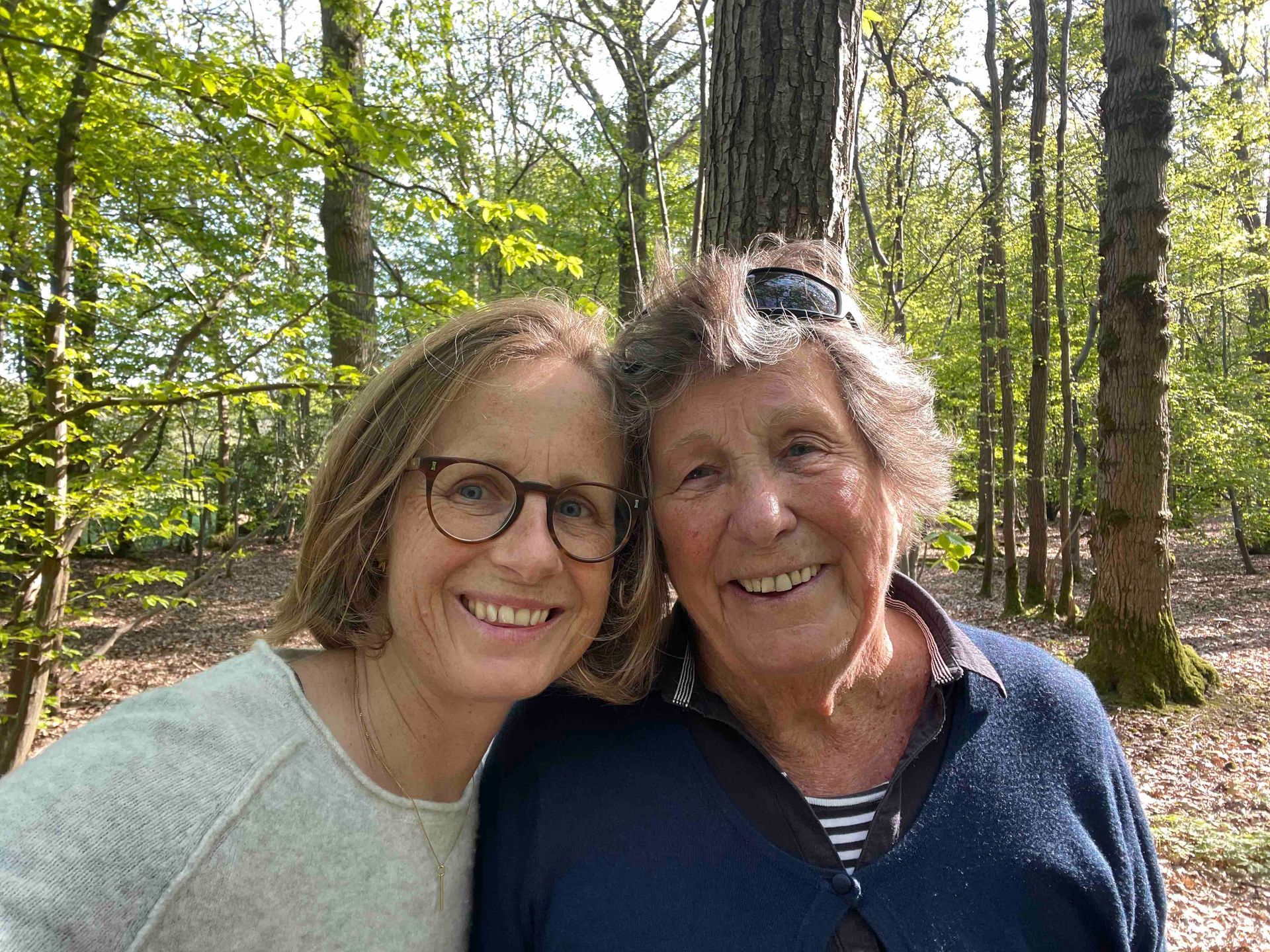Behind the sparkle
26 May 2023
How often do you doubt what you’re doing, or get discouraged?
Tina Turner, the legendary singer who died this week, overcame well-documented hardships throughout her life to enjoy huge global success. I heard on the Today programme yesterday (starts at 2h 38m) that when asked by Oprah Winfrey in 2013 to describe her legacy, Tina replied ‘My legacy is that I stayed on course from the beginning to the end because I believed in something inside of me that told me that you can get better, or you can make something better, and that I wanted better’.
We're not all Tina Turners, but her words are powerful. Towards the end of last year, I met up with an old friend I’d not seen in person for some time and who has worked for big businesses all of her career, progressing to a very senior role and managing a busy home life with children as well. To my amazement she told me she was deeply impressed by my entrepreneurship, profile and achievements since setting up my own business and that in comparison, she felt she had just trodden the corporate path in a far less exciting way. Whilst very touched by this, I was quite thrown by her comment.
Because the truth is, I’ve frequently wondered whether I’m doing the right thing and even whether anyone has noticed what I’m up to (there, I’ve aired my inner critic’s favourite jibe publicly). In this blog I’m finally coming out of my ‘self-doubt closet’ and confessing all. I’ve probably worked harder than I’ve ever worked before since setting up solo, spending 9 months writing my book, another 7 months finalising it and preparing to launch it, a further 15 months (and counting) post-launch promoting it, speaking, writing and podcasting about it. It has been a huge investment of my time and energy, and yes, I’ve pondered on a weekly basis what I’m getting back on that investment.
It's all too easy to compare ourselves to others in similar lines of work and to unhelpfully measure ourselves up against their external indicators of success and find ourselves coming up short. Believe me, authors building their businesses are just as prone to this as any other professional! There’s a whole raft of measures that can stoke our insecurity, including:
• How many print runs your book has had
• How high profile your speaking opportunities are
• Whether you’ve landed any bookshop signings and events
• Whether you’ve licensed any foreign language editions of your book
• What media coverage and appearances you’ve garnered
• How many positive online ratings and reviews your book has
I could go on. But what I’m learning is that book success (for which read: any kind of professional or career success) comes in many forms and flavours, and each of us follows our own path. As authors we helpfully swap ideas and learn from what each other is doing, which I hugely appreciate, but unless we’re Margaret Heffernan or Malcom Gladwell, we’re unlikely to be ticking all the boxes off the ‘Global Business Book Success’ checklist.
Sure there are the shiny moments that we celebrate publicly but for every one of those there are hundreds of hours of invisible graft behind the scenes. That’s one reason why, when I hit 2 years of daily running in November last year on an unusually bright day, I chose not to post a sunshiney celebratory photo of me out running with my husband, but instead I posted this photo of me out running alone the next day in the rain. Because that was the reality beind the big milestones.
Don’t get me wrong. I do feel very proud of what I’ve accomplished so far and it felt great to put my gladrags on last week and celebrate with other published authors as finalists at the Business Book Awards 2023. And it was utterly amazing to hear my name and my book’s title read out as winner in the People, Culture & Management category! Thank you to all who have commented on and celebrated this achievement with me on Linked In and in real life. (If you missed the news last week, my Insta reel has the highlights). My May newsletter is an unusually joyous edition. But as I float gently back down from cloud nine, it’s back to normality and writing this blog, updating my website, following up with clients enquiring about my talks, workshops and coaching programmes, booking in podcast guests and preparing my VAT return.
Because it’s putting the effort in every day, come rain or shine, that moves us forward; that grows our business or our book’s reach bit by tiny painstaking bit, each and every day. Success for me is just as much about the ‘keeping on going’ as it is about the occasional celebratory or highly visible moments that come along. If you’ve been plodding away at something in your work life, feeling like it’s slow going, or if you’ve been admiring other people’s successes, then this message is for you:
If you love what you do, if it you believe in it, and if you can afford to keep doing it, then don’t give up. As the saying goes, if it was easy then we’d all be doing it all of the time. The harder the effort and the longer the wait, the more rewarding that moment of success feels, as a wise teacher once gently explained to my 9 year old daughter who was sobbing after failing yet again to win her first ever medal at a school sports day.
I like the way James Cleare, author of Atomic Habits, puts it: ‘complaining about not achieving success despite working hard is like complaining about an ice cube not melting when you heated it from 21 to 31 degrees. Your work is not wasted; it is just being stored. All the action happens at 32 degrees’.
So when you’re full of doubt and feeling like you’re pushing water uphill, remember that to someone else your hard graft looks like enviably shiny success. And good things will come. So don’t give up.
Tina Turner, the legendary singer who died this week, overcame well-documented hardships throughout her life to enjoy huge global success. I heard on the Today programme yesterday (starts at 2h 38m) that when asked by Oprah Winfrey in 2013 to describe her legacy, Tina replied ‘My legacy is that I stayed on course from the beginning to the end because I believed in something inside of me that told me that you can get better, or you can make something better, and that I wanted better’.
We're not all Tina Turners, but her words are powerful. Towards the end of last year, I met up with an old friend I’d not seen in person for some time and who has worked for big businesses all of her career, progressing to a very senior role and managing a busy home life with children as well. To my amazement she told me she was deeply impressed by my entrepreneurship, profile and achievements since setting up my own business and that in comparison, she felt she had just trodden the corporate path in a far less exciting way. Whilst very touched by this, I was quite thrown by her comment.
Because the truth is, I’ve frequently wondered whether I’m doing the right thing and even whether anyone has noticed what I’m up to (there, I’ve aired my inner critic’s favourite jibe publicly). In this blog I’m finally coming out of my ‘self-doubt closet’ and confessing all. I’ve probably worked harder than I’ve ever worked before since setting up solo, spending 9 months writing my book, another 7 months finalising it and preparing to launch it, a further 15 months (and counting) post-launch promoting it, speaking, writing and podcasting about it. It has been a huge investment of my time and energy, and yes, I’ve pondered on a weekly basis what I’m getting back on that investment.
It's all too easy to compare ourselves to others in similar lines of work and to unhelpfully measure ourselves up against their external indicators of success and find ourselves coming up short. Believe me, authors building their businesses are just as prone to this as any other professional! There’s a whole raft of measures that can stoke our insecurity, including:
• How many print runs your book has had
• How high profile your speaking opportunities are
• Whether you’ve landed any bookshop signings and events
• Whether you’ve licensed any foreign language editions of your book
• What media coverage and appearances you’ve garnered
• How many positive online ratings and reviews your book has
I could go on. But what I’m learning is that book success (for which read: any kind of professional or career success) comes in many forms and flavours, and each of us follows our own path. As authors we helpfully swap ideas and learn from what each other is doing, which I hugely appreciate, but unless we’re Margaret Heffernan or Malcom Gladwell, we’re unlikely to be ticking all the boxes off the ‘Global Business Book Success’ checklist.
Sure there are the shiny moments that we celebrate publicly but for every one of those there are hundreds of hours of invisible graft behind the scenes. That’s one reason why, when I hit 2 years of daily running in November last year on an unusually bright day, I chose not to post a sunshiney celebratory photo of me out running with my husband, but instead I posted this photo of me out running alone the next day in the rain. Because that was the reality beind the big milestones.
Don’t get me wrong. I do feel very proud of what I’ve accomplished so far and it felt great to put my gladrags on last week and celebrate with other published authors as finalists at the Business Book Awards 2023. And it was utterly amazing to hear my name and my book’s title read out as winner in the People, Culture & Management category! Thank you to all who have commented on and celebrated this achievement with me on Linked In and in real life. (If you missed the news last week, my Insta reel has the highlights). My May newsletter is an unusually joyous edition. But as I float gently back down from cloud nine, it’s back to normality and writing this blog, updating my website, following up with clients enquiring about my talks, workshops and coaching programmes, booking in podcast guests and preparing my VAT return.
Because it’s putting the effort in every day, come rain or shine, that moves us forward; that grows our business or our book’s reach bit by tiny painstaking bit, each and every day. Success for me is just as much about the ‘keeping on going’ as it is about the occasional celebratory or highly visible moments that come along. If you’ve been plodding away at something in your work life, feeling like it’s slow going, or if you’ve been admiring other people’s successes, then this message is for you:
If you love what you do, if it you believe in it, and if you can afford to keep doing it, then don’t give up. As the saying goes, if it was easy then we’d all be doing it all of the time. The harder the effort and the longer the wait, the more rewarding that moment of success feels, as a wise teacher once gently explained to my 9 year old daughter who was sobbing after failing yet again to win her first ever medal at a school sports day.
I like the way James Cleare, author of Atomic Habits, puts it: ‘complaining about not achieving success despite working hard is like complaining about an ice cube not melting when you heated it from 21 to 31 degrees. Your work is not wasted; it is just being stored. All the action happens at 32 degrees’.
So when you’re full of doubt and feeling like you’re pushing water uphill, remember that to someone else your hard graft looks like enviably shiny success. And good things will come. So don’t give up.
Enjoyed reading this? Share it with others
Recent blogs

How far ahead do you typically think ? ‘Festive creep’ is a thing apparently, with the festive decorations, shopfronts and marketing campaigns officially starting earlier than ever before. (I ate my first mince pie on the last day of November – have I fallen prey too?). This seems to me to be another indication of how impatient and hurried we have become, always in a rush for the next arrival, to start the next new initiative at work or hit the next deadline, and in parallel our attention has become chopped up into ever-smaller increments in our rush to acquire, achieve and advance. I’m pondering how we can counterbalance our short-term, hyper-fast focus with a slowing down to help us take more in, look further ahead and expand our thinking. I’m as guilty of myopic busyness as anyone. My second business book People Glue launches on 26/27 January (quick plug: pre-order your paperback/hardback here or you can snap up the e-book for just 99p on the 26th January, add a reminder to your calendar here ) and we’re shortly heading off on a long-haul family adventure over the festive period. So I’m currently running several ‘to do’ lists concurrently, all intended very ambitiously to ‘get everything done’ by the time school’s out. I can’t see past the forest of work tasks, home admin, festive gift-buying and packing reminders that clog my view. With our departure date looming, I need to step back and look further ahead, or as the French say, ‘reculer pour mieux avancer’. My exasperated husband put it more bluntly, ‘yes we need to unblock the kitchen drain for the housesitters but a new rug for the sitting-room is NOT a priority!’ When I was researching for People Glue , I spoke to 25 or so CEOs, COOs and CPOs , many of whom talked about looking at their business through 2 lenses: one eye on daily operations and short-term results, the other on longer-term ‘moonshots’ that anticipated potential future developments and built organisational capability for tomorrow. Each lens brought insights and a counterbalancing view to the other. Individuals generally want the same in their lives too; to manage, on the one hand, the day-to-day load (at work and home) as efficiently and productively as possible whilst planning their next pay rise, promotion, job move, house refurbishment, holiday or family addition. They’re also zooming out to think about what matters most to them today and how this might evolve in the future. Even those who take a fairly spontaneous approach to their career opportunities hold firm to a set of longer-term beliefs and values that form a career compass guiding their decisions - listen to my podcast conversation with tech CEO Soulaima Gourani to hear how she does this brilliantly. I was fascinated to read at the weekend about the creation of a Clock of the Long Now (FT £, or here ), designed to measure the passing of 10,000 years. Located deep in a remote Texan mountain, it will confound our expectations of a clock by ticking once a year, chiming once a century and trumpeting a cuckoo once a millenium. All without winding and parts replacements. The same day, I listened to author and computer science professor Cal Newport talk about the lost art of long thinking on his podcast. He defines long thinking as ‘the persistent intentional application of your brain when you’re trying to create something new’ and points out how sustained attention is critical for long thinking. But thanks to smartphones, instant gratification and short-form ultra-digestible entertainment, we’ve lost the habit of thinking for ourselves and spend less time reading longer texts, reflecting, and writing as form of thinking. The renowned psychologist Daniel Kahneman shed light on our 2 speeds of thinking in his remarkable book Thinking Fast and Slow . We slip comfortably into fast thinking thanks to our cognitive biases and shortcuts, entrenched assumptions and easily-recalled (but incomplete or unreliable) data. It’s more effortful to engage in slow thinking – like writing with your non-dominant hand - because the latter requires sustained attention, the search for alternative perspectives and an exploration of the unfamiliar. I have a thirst for books, reading, bookshops and libraries that I’m belatedly learning is a powerful antidote to the short-term busyness and task accomplishment that I’ve become so used (addicted?) to. I’m curious to know what value business leaders place on reading, and learning, generally in their organisations, and asked a friend who’s running a 7,000 employee consulting business whether she thought corporate libraries were worth investing in. Her answer was revealing: her initial reaction was ‘not a priority’ but she swiftly followed that up with ‘but I would love to encourage people to switch off from the immediacy of work and find more time in their day/week to read/learn/reflect, engage in curiosity and expand their thinking horizons. I absolutely want to make this part of the way we work here’. If this strikes a chord, if you’ve established a corporate library or another mechanism e.g. a book club, reading circles etc, to grow people’s reading and thinking habits at work, then please do get in touch , and I’ll share my thoughts on this too. Here's how I’m trying to adjust the balance of my thinking time and extend my thinking horizons: 1. 10 minutes a day ‘still time’ – sitting quietly, doing nothing, to get used to the discomfort of switching to a slower pace. My brain twitches like mad for most of it but my mental hamster wheel does start to ease into a slower, more contemplative state. 2. Prioritising ‘reading windows’ for 20-30 minutes a day over other things I could do in that time . Phone down, jobs ignored, interruptions discouraged. I turn to my subscriptions - the FT, The Economist, Harvard Business Review and Sloan MIT Review – and have a browse. In the evenings I turn to fiction, often a Korean novel (translated) of late. 3. When drafting or planning, I’m reverting to ink pen and paper . I’m a fast touch-typist and writing out my thoughts by hand is more effortful, forcing me to think more carefully. My phone goes in Focus mode to silence notifications, and out of sight. What works for you? Or what thinking habit do you want to introduce? I’d love to hear what you’re reading at the moment or what you’re stacking up to read over the festive period and I’ll include a little book list in my New Year’s email. In the meantime, embrace the festivities your way and if that means ditching your to-do list in favour of some quality thinking, reading and reflecting time (mince pie or Celebration choc in hand), then go for it. Let’s make ‘thinking creep’ a thing instead.

How do you react when the going gets tough? We’ve been talking a lot about resilience at home. It’s a much-thrown-about concept I know, but I’m genuinely curious about how to really be resilient when the path you’re on feels anything but easy. Between anxiety-inducing news headlines, a tough job hunt for my stepson, my daughter finding school challenging, and clients navigating big transitions, 2025 has felt bumpy. The world of work is turbulent, with layoffs happening in multiple industries and budget cuts in others. GenAI adoption is shrinking early-career jobs, while over-55s are anxious about the future. Leaders and managers are grappling with the diverse needs of multigenerational, hybrid teams. I’ve been reflecting on how we ride out these bumps without feeling battered. Resilience isn’t something we magically have or lack - it grows as we show up consistently to adversity. Here are 3 resilience-building ideas. First, try reframing things. Reframing doesn’t fix a tough situation overnight, but it brings the energy to keep going. I love how my recent podcast guest, Soulaima Gourani, a globally recognized tech founder and World Economic Forum Young Global Leader, handles setbacks: ‘I don't look at my problems as problems, I look at them as projects. I’m just manipulating myself to think of life as a human experience. Even setbacks are an incredible opportunity to grow. I have a setback probably daily; I get used to it! When I call my girlfriends and we have a good laugh, I often share what went wrong that day. It just takes the spiciness out of it.’ You can hear more about being fearless in life and work in our conversation here . Second, focus on what we can influence. Stephen Covey’s framework in The 7 Habits of Highly Effective People describes a large ‘circle of concern’ within which sits a smaller ‘circle of influence’ (picture a donut). We waste energy worrying about things we can’t control; we build our resilience by putting our time and energy into those challenges which we do have some influence over. At work, that may mean: • Reflecting on what gives your work meaning. I discussed this with Professor Ying Zhou here . • Talking to your boss about reshaping your role, temporarily or long-term. My chat with Beth Stallwood about shaping better working lives may help. • Spotting new opportunities as stepping stones to a better work experience. • Building your skills to create more options for the future. At home, it’s about: • Accessing a coach or specialist advice if needed. • Focusing on eating, sleeping, and exercising consistently. • Finding pockets of time - however small - for things that recharge you. For me, that’s having a great book at hand to help me switch off, learning Korean for a few minutes a day, a coffee or a call with a friend, and the occasional spa treatment. Third, focus on the team. Resilience resides within teams . We can’t change everything alone, so talk about challenges and lean on your team (however you define ‘team’ at work and at home) for support. Workplace team resilience doesn’t demand a big ambitious programme, expensive external support or a flashy new employee benefit. Some powerful, low-cost habits make all the difference: • Having timely, quality conversations. • Setting up check-ins, building social bonds. • Making it easy for people to make reasonable requests. • Giving people chances to develop resilience through experience. Skilled managers are key - emotionally intelligent, with coaching and facilitation expertise. Find more ideas in my LinkedIn post or take a look at my outline for a new manager development programme here and please do get in touch if you want to chat about this, I’d welcome your input. And at home? Try: • Adjusting how you share the daily load. • Carving out lighthearted family time with no talk of challenges. • Sharing both your wins and stumbles of the week. • Asking, ‘how are you doing today on a scale of 1–10?’ (where 1 is ‘finding today very hard’ and 10 is ‘feeling at my brightest’). What helps you and your team at work or home? If things have been feeling bumpy for you too, I hope you can find your way onto a smoother path soon and please get in touch if I can listen or help.

How often do you get the luxury of extended, undisturbed time? Is there a quiet space or magical place you retreat to? I’m writing this in a silent house, up early before the rest of the family. All I can hear is the scratching of my ink pen on the paper and the cooing and chirruping of garden birds outside my window. No voices, machines, traffic, notifications or interruptions. I can hear myself think, there’s no-one calling for my attention and the jobs can wait. But at any minute, this brief lull will crumble. It's hard to get extended, undisturbed time. Many of us are spending less time in our home offices now more organisations have encouraged – or mandated – more in-office working. The majority of people still work a structured hybrid patterns, but likely 1-2 days per week at most at home. Not that home-working is typically quieter – diaries are still largely stuff with calls, messaging channels ping continously and the home distractions of pets demanding attention, chatty home-working partners, texts from teenagers at school or – my pet peeve – couriers knocking on the door, dropping the parcel outside and driving straight off while I’m halfway down the stairs thinking I’m needed. Our focus time is bounded by each interruption or intrusion into our attention. Some people I know say they need background noise to help them concentrate. At least 2 CEO’s I’ve spoken to prefer doing calls and emails in cafés and their office’s buzzy atrium where the constant hum of voices and hissing and thumping of coffee macines provide a cloack of anonymity around even sensitive conversations. Whatever your preference environment-wise, it turns out that noisy ones are actually damaging to our health; anything above the maximum recommended noise level of 53 decibels is described as a ‘ silent killer ’. A quiet library falls under this, your average office above it. Quiet time isn’t just about the decibel level, it’s also about freedom from distraction and interruptions. As I was telling over 200 sixth-form students at an Enterprise and Innovation conference a week ago, our brains prefer to focus on one task at a time and maintain an extended attention set – to get into ‘flow’, in other words. In terms of cognitive functioning, that’s when we are at peak performance. Every time our attention is tugged away from the task at hand, research has shown that it takes us over 2 seconds to reorient back to the task at hand. Known as the toggling tax, this happens on average up to 1,200 times per day, costing us 4 hours a week or 5 full weeks per year of lost attention, wasted time and reduced productivity. Ouch. So there’s a strong case for designing work environments that allow people to concentrate in quiet spaces and office design today is increasingly factoring this in. Co-working hubs and corporate offices now offer quiet zones where calls and conversations are not permitted; individual work spaces that look like padded, high-wall cubicles block out the rustling or key board tapping of workers either side; and individual sound-proofed call booths that keep noise leakage to a minimum. I’ve learnt the hard way to be more selfish with my quiet time when I’m writing, silencing notifications on my phone, putting noise cancelling headphones on and shutting the door to our companionable, aka needy, cat (and my companionable but not needy husband). I’ve been reminded this week of the power of quiet time and a restorative environment: I was fortunate to spend 2 nights at the UK’s only privately-owned national nature reserve in a luxury eco-cabin (hot shower and log burner included) overlooking 3,300 acres of marshland, big skies and an incredible array of wildlife. Having discovered it last year, I’d booked myself in again as a reward for getting to the ¾ milestone in writing People Glue and an incentive to crack on with the last 12,500 words as the manuscript deadline looms. In the magical peace and quiet, I wrote close to 3,000 words there – my average weekly output in just over a day – in long, undisturbed stretches punctuated only by my daily run, short walks to clear my head and the arrival of delicious dinners brought to my door. The biggest distraction was the wildlife outside the cabin’s huge glass windows: a mesmerisingly beautiful, shadowy-eyed short-eared owl did its utmost to persuade me to look up from my writing with its swooping, gliding and head-swivelling display. Hares bounded around playfully as buzzards, marsh- and hen-harriers patrolled hungrily overhead. A tiny wren skipped across my patio, tapping its beak on the glass doors, tail cocked up jauntily. No school runs, no pets to feed, no work calls, no washing macines to load, not unattended chores in sight nagging me reproachfully - I am very grateful to my wonderful husband for holding the fort at home so I could steal away. Perhaps you would prefer the cosmopolitan buzz of a city or a sunlounger beside a gleaming hotel pool - I wouldn’t say no to either at a different time. But soaking up this solitude, my time felt unbounded and that felt the biggest luxury of all. It has reminded me of the importance of consciously planned quiet time, ideally somewhere magical, for our wellbeing, our creativity and the quality of our thinking. I’m just wondering how soon I can book a return visit….






